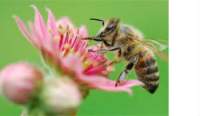
A Little Bit About Bees…
Bees are essential for the pollination of many plants that are vital not only to our diet but to a number of other animals’ as well. Bears, birds, mice, squirrels and other creatures are dependent on the nuts and seeds that result from pollination, according to Edward Spevak, curator of invertebrates at the St. Louis Zoo.
“They are maintaining ecosystems and our agriculture. One out of every three bites of food we eat depends on pollinators, and those mainly are bees,” says Spevak.
Many people are aware of bumblebees and honeybees, but did you know there are 20,000 species of bees worldwide? In North America alone there are over 4,000 species of bees.
Bees Are Not Aggressive
“Bees normally can care less about you," Spevak says. "It’s very difficult to actually get stung by most bees.” Honeybees and bumblebees may become aggressive if you approach their hive or colony because they will attempt to protect it, but unless they are provoked, most bees will leave you alone.
Not All Bees Live In Hives Or Are Social
According to Spevak, 70 percent of native bees nest in the ground and most bees are solitary. Ground nesting bees are also not aggressive. Even running a lawn mower over their nest will tend to get little reaction.
Let’s Help the Bees…
Two factors believed to be contributing to the problem are loss of habitat and heavy use of pesticides. Luckily, you can help bees when it comes to these two areas.
If you use pesticides on your home garden or lawn, make sure to read labels carefully: Many will advise against spraying when flowers are in bloom and bees are active. Some pesticide concentrations in home products can also be higher than those used for agricultural purposes, as people look for quick and easy fixes, says Spevak. Take your time to review products and investigate your options before spraying anything around your garden or lawn.
To help with loss of habitat, you can plant a garden. A garden with plants that will bloom from spring to fall creates a bee habitat — and makes you a conservationist. There are programs nationwide that advise people on how to create a bee-friendly garden and even explain how you can become a citizen scientist by collecting data on your bees.
Learn more about bees and how you can help them by visiting the St. Louis Zoo Website.
This information came from www.huffingtonpost.com